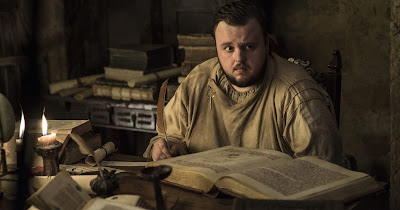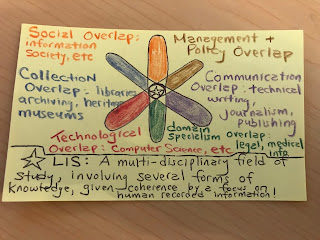"The Raven" by Ivan Misic is licensed under CC BY-NC-ND 4.0 via Creative Commons
Let me explain.
In our course at City, University London, we are exploring the phenomenon of creating a shared language on the web that computers can understand and speak. The idea is called Linked Open Data (LOD) and it is a component of what advocates call "The Semantic Web" (Floridi, for one, takes umbrage with this term and instead refers to it as the "Meta-Syntatic Web")(Floridi, 2009). One of the biggest advocates for establishing Linked-Open-Data is none other than Tim Berners-Lee, an English inventor who currently lives in Boston, Massachusetts, and the fellow who brought us the world wide web in the early 90s. In a much heralded 2009 TED talk, Berners-Lee explained some of the concepts of Linked Open Data (LOD). At one point, he even summoned his audience to scream out "Raw Data Now!"
It was the battle cry of nerds everywhere.
To his credit though, LOD has the possibility of nudging the economy and scientific/aesthetic/humanitarian spheres into overdrive - that's because instead of data exchange having to rely on human-to-human contact on the web via HTML (think of all those hyperlinks you see in webpages and documents), the new method would be computer-generated automatic links that do the heavy lifting for us.
As it stands now, much of the web's data is still couched in proprietary terms and trapped within the information silos of the earliest Web 2.0 pioneers like Facebook, Apple, LinkedIn, Instagram and Twitter. These behemoths, unsurprisingly, are slow to get on board and share their data (Amazon is actually one notable exception and has been opening it up its data through its Amazon Web Services). With the other big players, we are left with the dusty tools of HTML and HTTP, relying on human beings to make the connections and not computers.
Glenn Close and Easter?
photo by Alan Light
You may have noticed since 2012 that Google (another big player that is making strides in opening up data) created their "Google Knowledge Graph," an informative panel of the right-hand side of the page accompanying popular searches; it reads much like a Wikipedia entry. This creation is in line with linked open data; it is a graph mostly generated by computers rather than by human efforts.
For linked-open-data to work, it requires a triple:
OBJECT -------- PREDICATE -------- SUBJECT
The Predicate, or relationship, is the most important part.
Let us first go to "The Raven" example:
The following slides with the black background are from an excellent video by OCLC, the non-profit Online Computer Library Center, entitled "Linked Data for Libraries."
Photo Credit: Thomas Kilduff, Slide of OCLC's Linked Data for Libraries Video
Photo Credit: Thomas Kilduff, Slide of OCLC's Linked Data for Libraries Video
In linked-open-data, it is important to remember that one of the prerequisites is that each person, item, or concept has a URI (Uniform Resource Identifier). This is distinct from the more familiar URL (Uniform Resource Locator). Think of a URI similar to a book's ISBN, the 13-digit International Standard Book Number that is unique to each book in print. Thus, "The Raven," by Edgar Allen Poe, has a different URI than the common, squawking, blackbird "raven" (although each are equally spooky). The LOD programming schemes are able to disambiguate between them. With a separate URI, linked-open-data initiatives do not have to think closely about context (OCLC, 2012).
Photo Credit: Thomas Kilduff, Slide of OCLC's Linked Data for Libraries Video
So just for fun, I wondered if for experiment's sake I could see if linked-open-data would find a connection between Glenn Close and Easter, a sort of parlor game of "Two Degrees of Separation." If Glenn Close had played an unstable femme fatale in the 1987 hit thriller "Fatal Attraction" and her character had done something unspeakable to a pet bunny rabbit, would she be connected to the Christian holiday of Easter since that is popularly represented (at least in the U.S.) by the famous Easter Bunny?
Photo Credit: Thomas Kilduff, Still of Google search "Glenn Close Bunny"
Photo Credit: Thomas Kilduff, Still of Duck-Duck-Go search "Glenn Close Bunny"
Here you see that Google includes a Knowledge Graph when the search items of "Glenn Close and bunny" are paired but Duck-Duck-Go does not (although Duck-Duck-Go does include a knowledge graph when "Glenn Close" is searched alone). Neither search engine provides a Knowledge Graph with the exotic pairing of "Glenn Close and Easter." Coincidentally, it looks like Glenn Close (whom I adore for the record) wore a periwinkle, tin foil-like dress to a premiere in Australia last April, so a critic from the Sydney Morning Herald wondered if it heralded a trend (Singer, 2019).
Photo Credit: Thomas Kilduff, Google Search "Glenn Close Easter"
Photo Credit: Jordan Strauss, AP
So why is all of this important?
Many hardworking individuals and organizations have been making LOD a reality at places called Schema.org and the VIAF (Virtual International Authority File). Librarians, especially, have been on the front lines as we specialize in taxonomies and ontologies. In fact, libraries of all kinds (medical, public, academic, legal) are already using linked data in order for our institutions to operate.
Beyond that, the principle is about treating the internet and the world wide web as a shared resource, a utility rather than as a capitalist playground. Cooperation would flourish and those who want to cordon off their proprietary data would be banished from the marketplace and the conversation.
Personal Reservations
The idea of LOD is full of earnestness and idealism and is one in which hardworking individuals work across borders and languages. Participants include the national libraries of some three dozen different countries in places as diverse as New Zealand, Chile, Iceland, Lebanon, and Singapore (VIAF). If we can do that with coding languages, think of how we can share brainpower on other big-ticket agenda items like tackling inequality, poverty, disease, and climate change.
But it must be said: Are we giving the VIAF too much power as a centralising force? Are triples subject to hacking and grafitti? What if a spurned ex-lover was somehow able to hack into the system and claim that YOU (Subject) ----- ROBBED (predicate) ---- BANKS (OBJECT). Would that action be tedious if not impossible to clean up?
Additionally, is there a place for humour and irreverence, and poetry (excepting Poe) in the world of linked data? Would our on-line society become too literal? Would it become a place of less creativity and become a breeding ground for what JK Rowling calls "Muggles?"
And if everything is limited by the predicate (or relationship) within the triple, does this limit the dynamism of the human experience? Like Walt Whitman once said, "I contain multitudes." Were he alive today, would he find LOD too stifling?
------
Resources
Floridi, L. (2009) 'Web 2.0 vs. the Semantic Web: A Philosophical Assessment' Episteme. Available at: https://uhra.herts.ac.uk/handle/2299/3629 (Accessed: 30 October 2019).
OCLC (2012) Linked Data for Libraries [YouTube Video]. Available at https://www.youtube.com/watch?v=fWfEYcnk8Z8 (Accessed: 30 October 2019).
VIAF: Virtual International Authority File. Available at https://www.viaf.org/ (Accessed: 30 October 2019)
Links (Chronologically)
City, University London https://www.city.ac.uk/study/courses/postgraduate/library-science
Linked Open Data (LOD) https://www.w3.org/standards/
Tim Berners-Lee https://internethalloffame.org/inductees/tim-berners-lee
2009 Ted talk https://www.ted.com/talks/tim_berners_lee_on_the_next_web
HTML https://html.com/
Information Silo https://en.wikipedia.org/wiki/Information_silo
OCLC (2012) Linked Data for Libraries [YouTube Video]. Available at https://www.youtube.com/watch?v=fWfEYcnk8Z8 (Accessed: 30 October 2019).
VIAF: Virtual International Authority File. Available at https://www.viaf.org/ (Accessed: 30 October 2019)
Links (Chronologically)
City, University London https://www.city.ac.uk/study/courses/postgraduate/library-science
Linked Open Data (LOD) https://www.w3.org/standards/
Tim Berners-Lee https://internethalloffame.org/inductees/tim-berners-lee
2009 Ted talk https://www.ted.com/talks/tim_berners_lee_on_the_next_web
HTML https://html.com/
Information Silo https://en.wikipedia.org/wiki/Information_silo
Amazon Web Services https://www.europeandataportal.eu/en/news/amazon-launches-its-sustainability-data-initiative
Google Knowledge Graph https://hackernoon.com/wtf-is-a-knowledge-graph-a16603a1a25f
Linked Data for Libraries https://hackernoon.com/wtf-is-a-knowledge-graph-a16603a1a25f
ISBN https://en.wikipedia.org/wiki/International_Standard_Book_Number
Google Knowledge Graph https://hackernoon.com/wtf-is-a-knowledge-graph-a16603a1a25f
Linked Data for Libraries https://hackernoon.com/wtf-is-a-knowledge-graph-a16603a1a25f
ISBN https://en.wikipedia.org/wiki/International_Standard_Book_Number
Schema.org https://schema.org/
VIAF https://www.viaf.org/
Muggles https://harrypotter.fandom.com/wiki/Non-magic_people
VIAF https://www.viaf.org/
Muggles https://harrypotter.fandom.com/wiki/Non-magic_people














